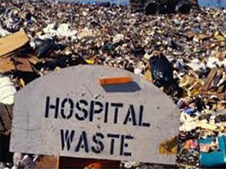|
 |
Dr. Pradeep Bhardwaj
CEO - Six Sigma Star Healthcare, Delhi |
Waste Reduction & Recycling Tips For Hospitals And
Healthcare Facilities
Medical
waste is one of the most important types of waste
management and reduction for the environment.
Hospitals can significantly reduce their waste by
combining waste prevention with a comprehensive
recycling effort.
Items That Are Recycled
In Many Hospitals:
When
you see the amount of waste generated in a hospital,
plastic represents a very large proportion. While much
of the plastic used at hospitals has a high value,
little of it is recycled. Within facilities, employees
need to be made aware of what plastics
 |
are
recyclable, and there’s the need for space to collect,
sort and store recyclables until they can be picked
up. Medical care is vital for our life and health, but
the waste generated from medical activities represents
a real problem of living nature and human world.
Improper management of waste generated in health care
facilities causes a direct health impact on the
community, the health care workers and on the
environment Every day, relatively large amount of
potentially infectious and hazardous waste are
generated in the health care hospitals and facilities
around the world.
Indiscriminate disposal of BMW or hospital waste and
exposure to such waste possess serious threat to
environment and to human health that requires specific
treatment and management prior to its final disposal.
Biomedical Waste Management
Biomedical waste management has recently emerged as an
issue of major concern not only to hospitals, nursing
home authorities but also to the environment. The
bio-medical waste generated from health care units
depend upon a number of factors such as waste
management methods, type of health care units,
occupancy of healthcare units, specialization of
healthcare units, ratio of reusable items in use,
availability of infrastructure and resources etc.
The
proper management of biomedical waste has become a
worldwide humanitarian topic today. Although hazards
of poor management of biomedical waste have aroused
the concern world over, especially in the light of its
far-reaching effects on human, health and the
environment. Now it is a well established fact that
there are many adverse and harmful effects to the
environment including human beings which are caused by
the “Hospital waste”
generated during the patient care. |
Hospital waste is a potential health hazard to the
health care workers, public and flora and fauna of the
area. The problems of the waste disposal in the
hospitals and other health-care institutions have
become issues of increasing concern.
The
Government of India (notification, 1998) specifies
that Hospital Waste Management is a part of hospital
hygiene and maintenance activities. This involves
management of range of activities, which are mainly
engineering functions, such as collection,
transportation, operation or treatment of processing
systems, and disposal of wastes.
One of
India’s major achievements has been to change the
attitudes of the operators of health care facilities
to incorporate good HCW management practices in their
daily operations and to purchase on-site waste
management services from the private sector
World
Health Organization states that 85% of hospital wastes
are actually nonhazardous, whereas 10% are infectious
and 5% are non-infectious but they are included in
hazardous wastes. About 15% to 35% of Hospital waste
is regulated as infectious waste. This range is
dependent on the total amount of waste generated
(Glenn and Garwal, 1999).
Classification Of Bio-Medical Waste
Sources of
Biomedical Waste
Hospitals produce waste, which is increasing over the
years in its amount and type. The hospital waste, in
addition to the risk for patients and personnel who
handle them also poses a threat to public health and
environment. |
|
Dr.
Pradeep Bhardwaj - Executive Director & CEO, Six
Sigma Star Healthcare Limited and Global Institute of
Healthcare Management, Delhi , an alumnus of IIM-
Ahmedabad is renowned hospital and healthcare
management expert, recipient of many prestigious
awards like - Limca Records holder for being the
“Youngest Medical Superintendent” at the age of 26
years, Rajiv Gandhi Award -2010, Padma Award-2012 :
Nominated by Chief Minister of Delhi, Youth Odol &
Youth Ikon Award : Delhi University, Indian Achiever
Award : UAE Govt., and Rashtriya Ratan Award-2009
(first recipient in healthcare management). He was a
nominee for young achiever Medical Excellence Award of
Infomedia 18 and Listed Top 10 Doctors of India,
Listed in 20 most influential people in healthcare. He
is also Board of Advisory in many healthcare
organizations / management institutes / universities.
He was also nominated as jury in the Times of India
‘Lead India’ contest. |
